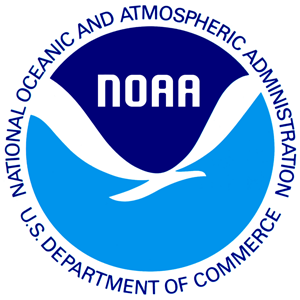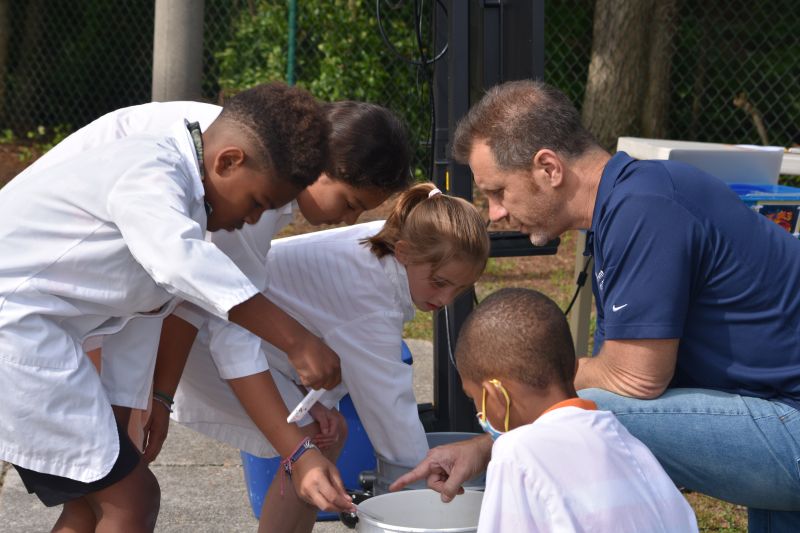Share this Story
Virginia Wesleyan Awarded NOAA Grant to Develop Accessible Environmental Education
Faculty-led team seeks to transform environmental education for diverse learners
University News | January 17, 2025
VWU has been awarded nearly $200,000 as part of the Chesapeake Bay-Watershed Education and Training (B-WET) program, a grant funded by the National Oceanic and Atmospheric Administration (NOAA). This funding will enable VWU to modify curriculum designed for third- through fifth-grade students with learning differences and those who are neurodivergent. The initiative aims to make environmental education more inclusive and impactful across the Chesapeake Bay watershed. 
The Chesapeake Bay watershed spans over 64,000 square miles and is home to diverse ecosystems and communities. Protecting this critical resource is a shared responsibility, and the B-WET program fosters collective action by supporting Meaningful Watershed Educational Experiences. These experiences combine outdoor and classroom learning to help students investigate local environmental challenges and take informed action.
Bridging Environmental Education and Accessibility
The project, titled “Meaningful and Accessible Environmental Education,” addresses the underrepresentation of students with disabilities in environmental education. Research indicates that students with learning differences often miss out on critical aspects of environmental science, despite its inclusion in standard curricula. By focusing on accessibility, this initiative ensures that all students, regardless of learning ability, can engage meaningfully with environmental science.
Led by Dr. Bill McConnell, Batten Associate Professor of Education/Director of Education Programs, and Dr. Mindy Gumpert, adjunct assistant professor, VWU’s team of faculty and students will adapt the curriculum it designed for its highly successful Shared Waters project, also funded through a NOAA grant.
“We’ll be working with teachers who know their kids and how they learn,” Dr.Gumpert said. “By accommodating the learning styles of this student population, we want to create experiences for these students that really resonates with them, instilling within them the importance of environmental stewardship.”
Through this new grant, students will learn to:
- Understand what a watershed is and how it functions
- Analyze how human activity affects watershed health
- Measure stream health using biological and chemical methods
- Use modeling software to study the impact of land surfaces on water runoff
Accommodations may require some trial and error, while others can be handled with a simple fix. “Students with autism may need gloves to engage in the stream activities,” Dr. Gumpert said, “or an emotional regulation break if they need a breather from the outdoor experience because of a sensitivity to noise.”
The program will provide teachers with comprehensive training and materials, including ready-to-use lesson plans and a kit filled with resources. This approach ensures that the curriculum can be seamlessly integrated into classrooms and sustained long-term. 
Long-Term Benefits for Students and the Environment
As a result of this grant, participating schools will permanently integrate the enhanced curriculum into their science programs. By engaging students in activities such as water quality testing, simulation modeling, and environmental action projects, the program fosters critical thinking, scientific inquiry, and environmental stewardship.
Research underscores the benefits of outdoor learning for students with learning differences. Studies show that just 20 minutes of outdoor education can improve attention and decrease disruptive behaviors, while participation in hands-on science activities can boost academic performance by as much as 27 percent.
Expanding Reach and Sustainability
In addition to serving the immediate needs of participating schools, the project aims to disseminate its findings and materials to a broader audience. VWU plans to present the curriculum at educational conferences, create online resources, and collaborate with other institutions to expand its impact across Virginia and beyond.
Moreover, this initiative aligns with the educational mandates established under the 2014 Chesapeake Watershed Agreement. Signed by the governors of the five states within the watershed, this agreement emphasizes the importance of environmental literacy and stewardship to support the Bay’s health. By fostering inclusive education through grants like this one, VWU helps fulfill these commitments, ensuring that all students gain the knowledge and skills to protect this critical resource.
“The health of the Chesapeake Bay watershed depends on the collective action of the next generation,” Dr. McConnell said. “By making environmental education accessible to all students, we’re not only addressing achievement gaps but also empowering future leaders to protect our natural resources.”
With NOAA’s support, VWU continues to lead in sustainability and environmental education, ensuring that every student has the opportunity to make a meaningful impact on their local environment and the broader watershed.

